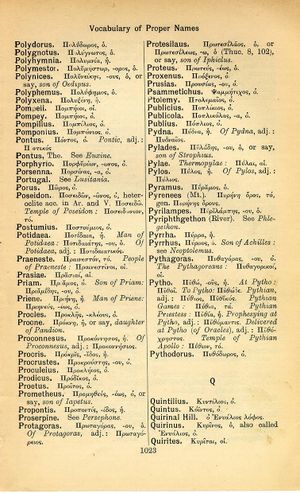Polyhymnia
αἰὼν παῖς ἐστι παίζων, πεσσεύων∙ παιδός η βασιληίη → time is a child playing draughts; the kingship is a child's | a life-time is a child playing, playing checkers: the kingship belongs to a child | a whole human life-time is nothing but a child playing, playing checkers: the kingship belongs to a child | lifetime is a child at play, moving pieces in a game; kingship belongs to the child
English > Greek (Woodhouse)
Πολυμνία, ἡ.
Latin > English (Lewis & Short)
Pŏlyhymnĭa: (Pŏlymnĭa, Poët. ap. Anth. Lat. 1, p. 51 Burm.), ae, f., = Πολυμνία (she of many hymns),
I one of the Muses, Hor. C. 1, 1, 33; Ov. F. 5, 9; Mart. 4, 31, 7; Aus. Idyll. 20.
Latin > French (Gaffiot 2016)
Pŏlўhymnĭa, æ, f. (Πολύμνια), Polymnie [muse des rythmes multiples] : Hor. O. 1, 1, 33 ; Ov. F. 5, 9.
Latin > German (Georges)
Polyhymnia, ae, f. (griech. Πολύμνια, dah. auch lat. Polymnia, Auson. edyll. 20, 7. p. 251 Schenkl), die Gesangreiche, eine der Musen, Hor. carm. 1, 1, 33. Ov. fast. 5, 9. Mart. 4, 31, 7.

